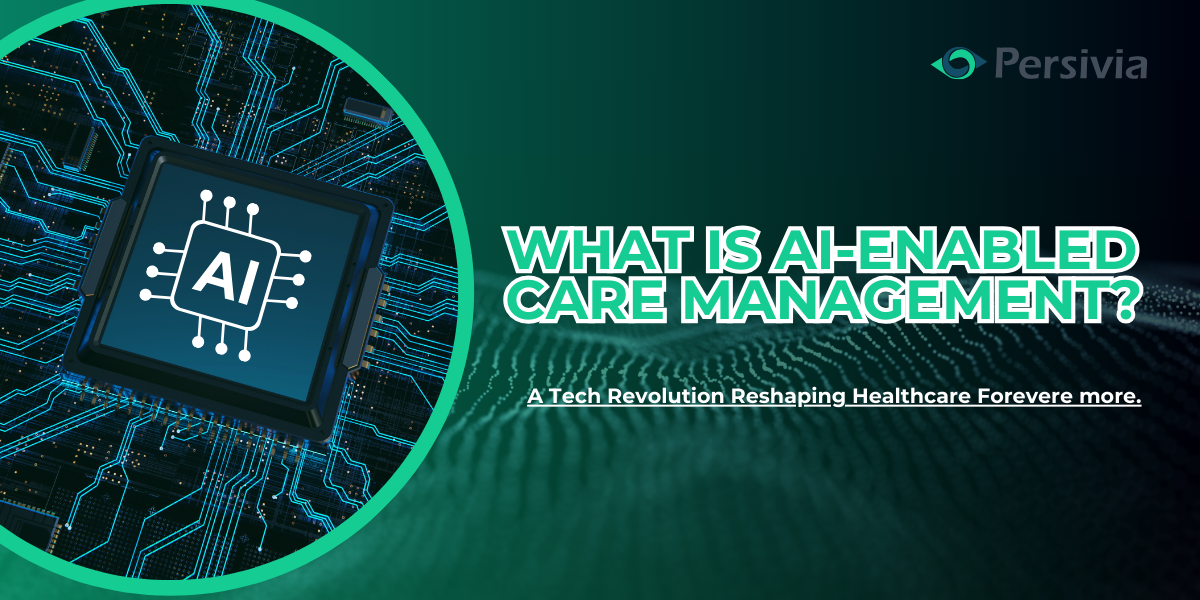healthcare

May 20,2025 • 5 min read
What is AI-Enabled Care Management? A Tech Revolution Reshaping Healthcare Forever

In the quickly changing healthcare sector, smart technology like AI is essential for enhancing patient care, expediting administrative procedures, and cutting expenses. You must have heard so much about its integration in healthcare. You must be wondering what is AI-enabled care management. Well, this modern technology integration in healthcare systems more proficiently evaluates patient information, finds gaps in treatment, and improves communication between providers. It improves productivity while guaranteeing improved patient outcomes by automating repetitive operations and offering predictive insights.
When such AI solutions are incorporated into healthcare, provider objectives, and patient requirements are aligned, improving treatment plans, lowering readmission rates, and allocating resources more effectively. Contemporary solutions are changing the way care is provided, from managing chronic illnesses to anticipating health hazards. However, why are these breakthroughs so significant?
How Technology Contributes to Care Management
Technology like AI in care management is extensive, offering real-time insights and automating essential processes. Below are key ways it enhances care management:
1. Automating Administrative Tasks
Automated solutions reduce the need for human work by handling care coordination, insurance claim processing, and appointment scheduling. As a result, medical personnel may focus more on patient care and less on administrative tasks.
2. Identifying High-Risk Patients
Predictive risk models use medical data to determine who is most likely to develop chronic conditions or see a decline in their health. Early detection enables proactive intervention, reducing emergency visits and hospitalizations.
3. Supporting Chronic Pain Management
Analyzing treatment histories and real-time patient data, advanced tools recommend personalized pain management strategies. Optimizing drug doses and treatments reduces dependence on opioids while improving patient comfort.
4. Managing Large Healthcare Datasets
Healthcare generates vast amounts of data daily. By organizing, analyzing, and deriving valuable insights from this data, intelligent solutions enhance operational effectiveness and decision-making.
5. Enabling Personalized Patient Care Planning
Adherence and health results are enhanced by personalized treatment regimens based on lifestyle, genetics, and medical history. More successful treatment plans are guaranteed with personalized attention.
6. Enhancing Preventive Care
Identifying possible health hazards before symptoms manifest, predictive analytics enables prompt action. Preventive treatment improves general health and lowers long-term medical expenses.
Gains For Healthcare Payers and Providers
Both healthcare professionals and payers may benefit greatly from technology, which improves patient experiences and maximizes resource usage.
|
Benefit |
Description |
|
Efficiency |
Automates administrative tasks, streamlining workflows. |
|
Accuracy |
Reduces human errors by analyzing large datasets and offering precise recommendations. |
|
Better Outcomes |
Helps detect diseases early and tailor treatment, improving recovery rates and quality of life. |
Enhancements in Patient Care and Operational Efficiency
Beyond administrative automation, technology is reshaping how patient care is delivered. Here are key improvements:
1. Predictive Risk Modeling
Analyzing medical history, lifestyle, and genetic predispositions, predictive models help healthcare providers intervene early and manage risks effectively.
2. Clinical Message Automation
Automated responses ensure timely and accurate communication between medical professionals and patients, improving engagement.
3. Patient Prioritization Modeling
Systems rank and prioritize patients based on urgency, allowing healthcare teams to focus on those requiring immediate attention.
4. Automated Consumer Messaging
Personalized messaging considers language preferences, clinical history, and social determinants of health (SDoH), increasing patient engagement and satisfaction.
5. Intelligent Care Plans
For patients managing multiple chronic conditions, tailored care plans help providers design more effective treatment strategies.
6. Streamlined Patient Navigation
Assisting with scheduling, insurance verification, and other logistical aspects, automated tools contribute to a smoother healthcare experience.
7. Automated Patient Assessments
Generating visit summaries and educational materials reduces the workload for healthcare staff while ensuring comprehensive patient records.
8. Personalized Benefit Summaries
Customized summaries of benefit plans enhance transparency and improve member satisfaction.
9. Data-Driven Reports and Analysis
Healthcare providers can create reports, spot trends, and make well-informed policy decisions with the aid of advanced analytics.
Organizational Readiness for Technology Integration
Successful adoption of intelligent solutions depends on an organization’s preparedness. To ensure seamless integration, healthcare providers should:
-
Start with lower-risk applications before scaling up.
-
Ensure solutions align with existing workflows and infrastructure.
-
Identify key areas where technology provides the highest return on investment.
-
Keep an eye on implementation and make adjustments depending on actual results.
Healthcare businesses may optimize the advantages of technology while adhering to industry norms by using these measures.
Persivia CareSpace®: Intelligent Care Management Solutions
A leading example of advanced care management is CareSpace® by Persivia. This comprehensive platform has been developed over 15 years to enhance care delivery and patient outcomes.
Key Features of CareSpace®
-
Data-Driven Insights: Integrates clinical and financial data for precise risk assessment and patient engagement.
-
Over 200 Clinical Programs: Offers specialized patient pathways tailored to individual needs.
-
Real-time data integration: Combines information from electronic health records (EHRs), home devices, and other sources to provide a whole patient viewpoint.
-
Automated Program Eligibility: Facilitates the enrollment process for Chronic Care Management (CCM), Transitional Care Management (TCM), and Annual Wellness Visits (AWV).
Note: CareSpace® is a reliable option for healthcare providers looking to improve productivity and patient care since it has been acknowledged by Gartner for its innovations in intelligent care management.
jack colin Details
User Profile
- Full name
- jack colin
- Email address
- jackcolin258@gmail.com
- Join Date
- 2025-05-20
- State
- City
- Pincode
- Address
- Follow us on Facebook
- Follow us on Twitter
- Website Name
- Bio